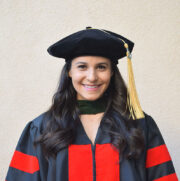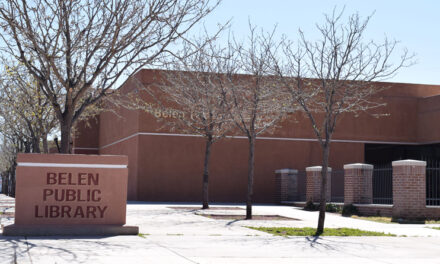BERNARDO — A Belen High School and University of New Mexico graduate is making her way to Oregon Health and Sciences University in Portland, Ore., for her three-year medical residency.
The daughter of former adjutant general of the New Mexico National Guard Andrew Salas and Socorro County Commissioner Martha Salas, Arinea Salas grew up in Bernardo but attended school in Belen for most of her life.

Arinea Salas graduated medical school and will be doing her residency at Oregon Health and Sciences University in Portland, Ore.
Submitted photo
Salas grew up participating in a variety of sports, from soccer to cross country, in addition to student council and the National Honor Society. During her senior year of high school and throughout college, she worked on and off as a manager at Long John Silver’s whenever she could.
“As weird as it sounds, it helped me with medical school,” Salas said. “It actually taught me a lot about having a large workload and having to manage a whole team of people.”
Salas graduated from The University of New Mexico School of Medicine this spring.
At the age of 1, Salas had open heart surgery and had an annual appointment with her cardiologist since then. She says this is where her interest in medicine began.
“It was always interesting — just the technology they would use to look at my heart and the scar down my chest from that surgery,” Salas said. “It was this whole other world that I was interested in and wanted to know more about.”
In the sixth grade, Salas decided if she wanted to pursue a career in the medical field, she would have to make a plan for school and stick to it.
“I realized I’m going to have to do well in high school because if I do well in high school I can get good scholarships to go to a good college and then medical school,” she said. “So I really had to have that mapped out before high school.”
Salas has stuck with that plan, through hard work and dedication in pursuing her goal.
“It took me being really stubborn and saying I’m going to do something is what led me down this path, for better or for worse. Definitely, right now it’s better. Med school was the best time of my life and the worst,” Salas said with a chuckle.
She is pursuing internal medicine, which to put it simply, is adult medicine, Salas said. She’ll see patients who are dealing with complications from diabetes and respiratory issues such as COPD.
“It deals with a lot of common problems adult patients have. For example, patients going into the hospital with COVID-19, and before they’re admitted to an intensive care unit they can be admitted in the general hospital ward, those are my patients,” Salas said.
During the third year of medical school, students are able to gain hands-on experience by shadowing physicians in various areas of specialization. Salas was drawn to internal medicine because she gets to help patients through a stressful time of their life.
“I really like the medicine of it, too. It involves issues with the heart, the lungs, the kidneys and you have to know a lot about different organ systems and I really liked that,” she said. “I really loved forming that relationship with those patients during rotations.
“A lot of these patients are towards the end of their lives, and it’s an honor to help guide patients during a time like that. Not even just the patients, but the families as well.”
For Salas, a major component in this journey is remembering to stay humble. She said it’s common to think of someone who is in medical school as a savior because they worked so hard to get into it, which isn’t necessarily the case.
“You have to be humble because medicine is constantly changing, and you’re not the one who is the savior — it’s the patients who work hard to deal with this crazy time in their life,” Salas said. “You, as a doctor, are more of a guide than a savior because for some of these patients who are at the end of their life, I can’t save their life, I’m not God. I learned the way to be a good doctor is to be humble and to constantly learn and read the literature because things are always changing.”
Salas said attending medical school taught her important life skills beyond practical medicine.
“I think it’s important to know that your whole identity is not completely in medicine. I am not just a doctor; I am not a robot who knows so much about a body,” Salas said. “You have to really learn how to manage your schedule well. You need to exercise, hang out with friends, to pursue your hobbies to have a well-rounded life.”
At the beginning of a student’s fourth year of medical school, they send out applications for different programs of residency. Students get matched to certain programs based on a computer algorithm. Salas interviewed with about 12 programs and ranked them from one to 12 and the program will rank the students who apply.
Match Day is almost bigger than graduation, Salas said.
“Match Day is this huge day in March when we open the envelope and see where you’re going for the next number of years,” Salas said. “Although this year with the pandemic, we weren’t able to celebrate with everyone.”
She said while her graduating class was affected by COVID-19, it won’t make as much of an impact as it will for third- and second-year students.
“Their schedules got really messed up in terms of rotation, so we’re going to see a big difference in medical education because of the pandemic, just like everywhere else in different capacities,” Salas said.
She’ll be in Portland for the next three years and potentially more if she pursues a fellowship in a more specialized field.
“I’m excited to go learn medicine somewhere else and bring that back to New Mexico,” Salas said. “I might come back and work as a hospitalist, which is someone who works in the hospital and works with patients who are sick but not sick enough for the ICU.”















